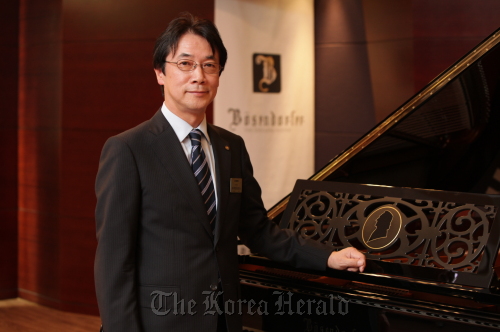Yamaha Korea CEO targets Korean musicians with Austrian premium piano
Bösendorfer, a premium piano brand from Austria, has been added to the list of other well-known piano brands such as Steinway and Bechstein for professional pianists in Korea, as Yamaha Music Korea, the brand’s exclusive distributor, launched it Thursday in Seoul.
Bösendorfer was established in 1828 in Vienna, Austria and currently produces about 350 pianos per year, 90 percent of which are shipped overseas.
The brand is known for Franz Liszt’s life-long preference and because some of its pianos unusually have 97 keys, as opposed to the standard 88 keys.
Since the Austrian piano manufacturer became a subsidiary of Yamaha Corp. in 2008, Bösendorfer has reached the Asian market of Japan, Thailand, Singapore and Korea, as well as Europe and the U.S.
“Other well-known pianos have power to project their sounds to the end of a concert hall. Those pianos are designed for big concert halls. Bösendorfer doesn’t seem so strong,” said Hitoshi Fukutome, president of Yamaha Music Korea, in an interview with The Korea Herald.
“But Bösendorfer sings like a human voice and is suitable for chamber music or it can be an accompaniment instrument. It has a good character, appealing to some people.”

Hitoshi Fukutome, president of Yamaha Music Korea, stands next to a Bösendorfer piano at a Yamaha showroom in southern Seoul on Thursday. (Yamaha Music Korea)
Bösendorfer targets professional musicians who understand the difference of the Austrian brand from many other musical instruments, and the wealthy who are looking for “something different but genuine and traditional,“ he said.
“There are so many Korean musicians studying in Europe including Germany, Austria, France and Italy. Especially those in Austria know the benefit and quality of Bösendorfer instruments,” Fukutome said.
In terms of price, Bösendorfer is in a similar price range as Steinway. The price of one Bösendorfer equals that of nine to 10 Yamaha pianos, according to company officials.
Fukutome, who took office in March last year in Seoul, said Yamaha Music Korea’s revenue grew 10 percent to 75 billion won in 2010 from a year earlier and its operating profit jumped 19 percent to 5.4 billion won during the same period.
The 53-year-old attributed the robust business last year to the overall recovery of the piano market in Korea and growth in sales of other musical instruments including brass, wind and guitar.
Until two years ago, only 5 percent of the firm’s total revenue came from the sales of audio-visual equipment.
However, the AV ratio has doubled to 10 percent now, on the back of iPod-related products, Fukutome said.
Excluding the AV part, Yamaha’s market share in Korea is about 24 percent.
Since last year’s performance was relatively good, the company projects a 3 percent growth in revenue in 2011, he said.
Yamaha Music Korea was established in 2001 and Fukutome is the third president.
Previously, he served as assistant general manager of the keyboard department of Yamaha Corp. America and president of Yamaha Music Austria.
“As the third president (in Korea), I have a slightly different mission of pushing the company to the next level. As a relatively young company, employees are not well trained compared to those in other subsidiaries of Yamaha,” he said.
“I’m trying to convey the philosophy and spirit of Yamaha to the local staff, which is to provide musical instruments with quality services as well as music school activities for children and adults.”
Yamaha Music School for students in Korea now has 21 directly-operated branches across the nation with 6,500 enrollments.
The school’s systematic curriculum helps people enjoy and listen to music, as opposed to Korean piano hagwon institutes, which focus on how to develop musical skills, he said.
By Kim Yoon-mi (yoonmi@heraldcorp.com)






